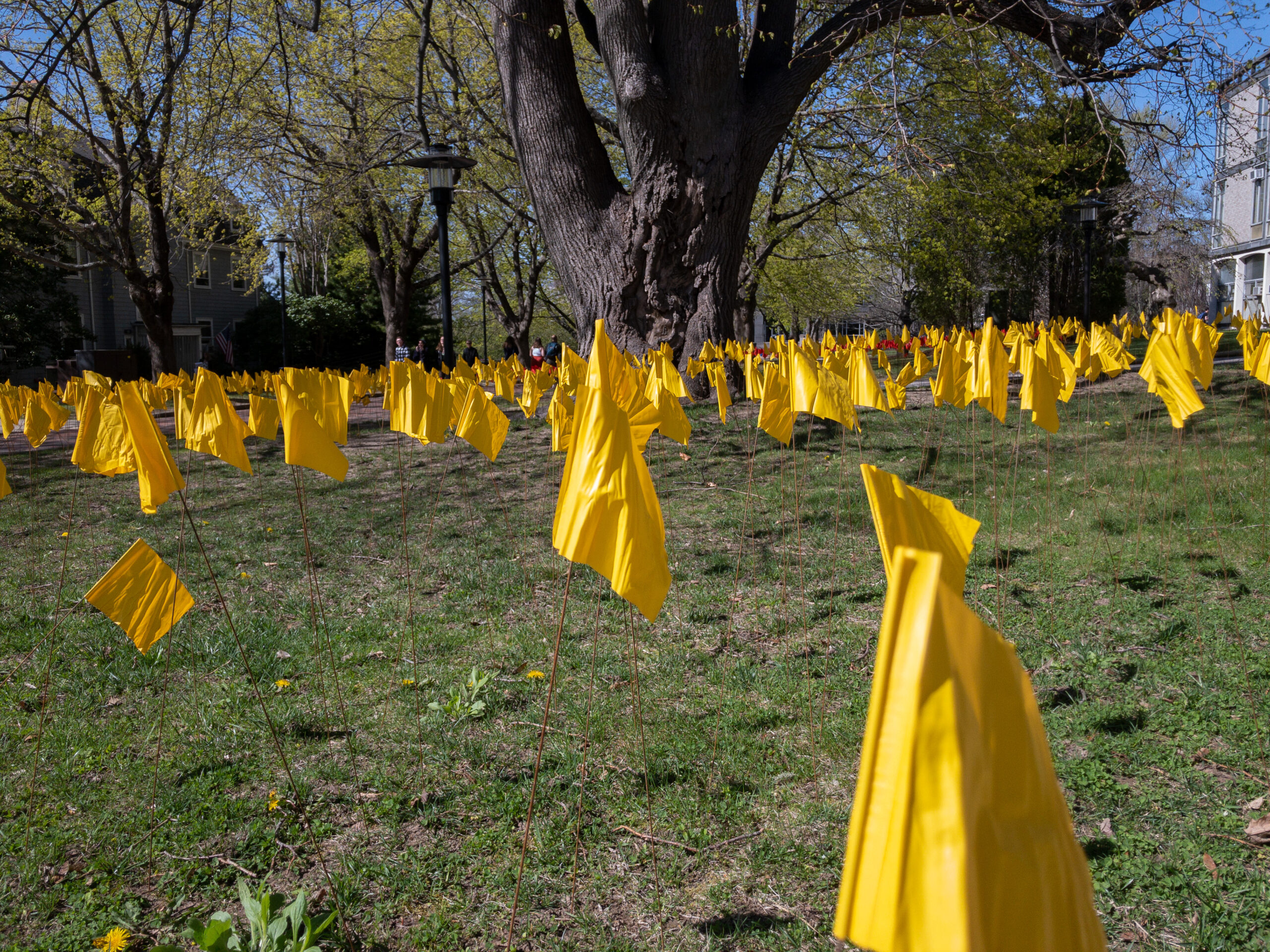URI Hillel honored victims of the Holocaust with flags along the Dieter Hammerschlag Mall. PHOTO CREDIT: Eddie Melfi | Staff Photographer
Sharing two stories of turmoil and triumph, 95-year-old Holocaust survivor Alice Eichenbaum discussed how she witnessed the war in Bulgaria and how her husband survived Auschwitz at the University of Rhode Island on April 18.
“[My husband and I] were more or less the same age, we grew up at the same time, with the same people — the Germans — but in different places,” Eichenbaum said. “Oh, how different our lives [were] shaped.”
Held in the Swan Hall Auditorium at 5 p.m., Eichenbaum’s lecture was part of the URI Hillel Center’s series of events commemorating Yom HaShoah, Holocaust Remembrance Day. The day marks the anniversary of the Warsaw Ghetto Uprising of 1943, according to the United States Holocaust Memorial Museum.
Despite being born in Vienna, Austria, Eichenbaum explained that she grew up and attended private school in Sofia, Bulgaria. Spending weekdays at school and summers in the Black Sea, Eichenbaum stated that she “lived a simple life.”
“In March of 1941, the German troops marched into Bulgaria and my life changed right away,” Eichenbaum said. “That day… the swastika started to fly.”
Being the only Jewish girl in her class, only accompanied by one Jewish boy, Eichenbaum described how she became reduced to the small Yellow Star of David button sewn to her left side.
“We were together since we were in Kindergarten, but all of a sudden, because I was Jewish, nobody would even talk to me,” Eichenbaum said.
Jewish people were no longer allowed to own businesses, so Eichenbaum’s father lost his job, according to her. Unable to walk on main streets or sidewalks, restrained to a daily curfew and banned from public places, Eichenbaum witnessed the “slow changes.”
Eichenbaum and her family were one of the first transports out of Sofia, and survived in a ghetto by the Turkish border until Soviet Liberation on Jan. 27, 1945, according to her.
Confined to a small house with no running water or plumbing, no medical assistance and little food, Eichenbaum had only one hour of freedom: from 11 a.m. to 12 p.m. She spent that hour going back and forth from a well, bringing buckets of water back so that her family had something to drink.
“I still think back to how many nights I went hungry to bed and not knowing yet tomorrow if there was anything to eat,” Eichenbaum said. “But I always felt safe as long as I was with my family.”
On Sept. 3, 1939, Eichenbaum’s future husband, Raymond, ‘60, witnessed Hitler march into Poland. He was 10.
“[His] life changed overnight, and as slow things were going for me, how fast things were going with him,” Eichenbaum said.
Due to the severe Polish winters and malnutrition, people in her husband’s ghetto were dying from left to right, according to Eichenbaum. Every day there were new orders, less food and more punishments.
In August of 1944, her husband, along with his 18-year-old brother and 20-year-old sister, boarded a kettle car with no water and no direction, according to Eichenbaum. He was 14.
The train stopped and Eichenbaum’s husband was met with a sign that read “Arbeit macht frei,” or “Work makes you free,” according to Eichenbaum. It was the entrance to Auschwitz-Birkenau, Nazi Germany’s largest concentration and extermination camp, according to Encyclopedia Britannica.
“He always said that he could not forget the screams of people and the smell of smoke,” Eichenbahm said. “You didn’t stay long in Auschwitz.”
Immediately separated from their sister, Eichenbaum’s husband and his brother were tattooed and sent to work in coal mines, according to Eichenbaum. Short and malnourished, he climbed into mines holding dynamite.
Eichenbaum’s husband described his last moments with his brother in an essay entitled “A Man I Shall Never Forget.” He wrote the essay for an English class at URI in 1957, according to Eichenbaum.
“As the train was slowly pulling out of the camp, and I waved my final farewell to him, at this moment, he pulled his own jacket off and threw it to me,” Eichenbaum read from the essay. “As long as I live I shall never forget his trembling, frail figure standing there, waving… This self-sacrificing and wholly good man was and will remain as my ideal. He was my brother.”
After being placed in a foster home in Providence, Eichenbaum stated that her husband made it a point to share his story — urging people to not give up hope.
Eichenbaum’s lecture was introduced by Daniel Grossman, a third-year biomedical engineering major and descendant of Holocaust survivors. Grossman visited Germany and Poland in the summer of 2019, as part of a fellowship program sponsored by the Holocaust Legacy Foundation, according to him.
“I returned home from the trip with a renewed purpose: to preserve and perpetuate the memories and lessons of the Holocaust for future generations,” Grossman said.
In sharing her and her husband’s stories, Eichenbaum hopes to show how circumstances can be while continuing to preserve history.
“Enjoy life because you never know what tomorrow will bring,” Eichenbaum said. “Yesterday is history, today is a gift and tomorrow is a mystery.”

